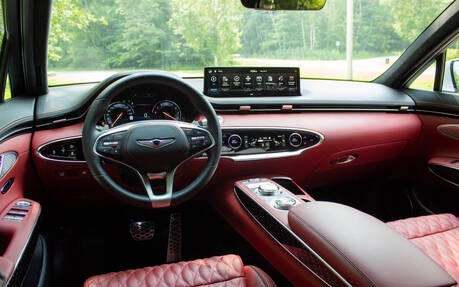These Car Brands Have the Best Tech and Infotainment in 2023
How much are technology and infotainment important to you when shopping for a new car, truck or SUV? One thing’s for sure: automakers spend a whole lot of time and effort adding tech features and other gadgets to their vehicles to supposedly make the driver’s life easier.
Once again this year, Korean companies lead J.D. Power’s U.S. Tech Experience Index, which is based on responses from more than 82,000 owners of new 2023 model-year vehicles who were surveyed after 90 days of ownership. It combines the level of adoption of new technologies for each brand with excellence in execution—specifically, how much owners like the technologies and how many problems they experience while using them.
- Also: Fewer Canadians Now Considering an EV, New Study Finds
- Also: New-Vehicle Owner Satisfaction Keeps Sinking, Study Finds
With a score of 656, Genesis continues to rank highest overall and highest among premium brands. Hyundai (547) and Kia (528) rank highest among mass-market brands.

Tesla (773) would have been the overall leader, but once again the company fails to meet all of the criteria in the study. Same thing for Polestar, Rivian and Lucid.
Here is how the top 10 stacks up:
- Genesis (656)
- Hyundai (547)
- Cadillac (533)
- Lexus (533)
- BMW (528)
- Kia (528)
- Mercedes-Benz (534)
- Volvo (509)
- GMC (505)
- Land Rover (499)
At the bottom of the ranking are Mitsubishi (440), Chrysler (436), Dodge (424) and Jaguar (411), with Mazda (387) well below every other brand due to its infotainment system that seems to annoy most drivers. It doesn’t help that the centre display’s touchscreen capability is either missing or available exclusively when using Apple CarPlay and Android Auto in certain models.

As J.D. Power notes, battery-electric vehicle (BEV) owners experience more problems with advanced technology than do owners of internal combustion engine (ICE) vehicles. Seventeen of the 21 advanced features offered on both fuel versions have more quality problems per 100 vehicles for BEVs—excluding Tesla—than for ICE vehicles. In addition, satisfaction is lower for BEVs across 86% of the advanced techs compared with those on ICE vehicles.
Features such as remote parking assistance and interior gesture controls have some of the largest gaps between the two fuel versions.
“Innovation through a strong advanced tech strategy is crucial for all vehicle manufacturers, especially those working to build their reputation in the electric vehicle space,” says Kathleen Rizk, senior director of user experience benchmarking and technology at J.D. Power. “The perception in the industry is that most BEVs should offer many advanced technologies to compete with high-tech entrants like Tesla. Success will be dependent on those manufacturers that can execute flawlessly, while ensuring the user experience is the same for those who are tech savvy and those who are not.”
